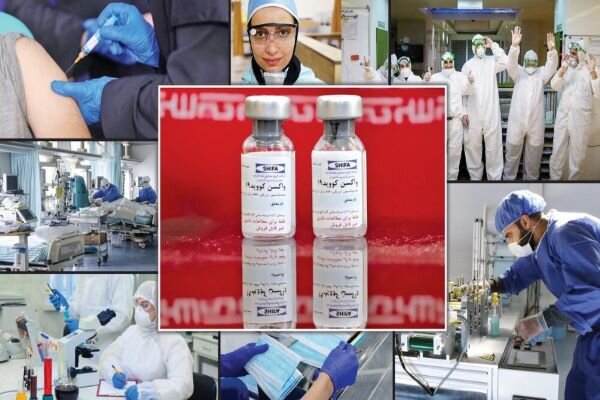“In those early days, we all felt that we entered a new dark world much like those shown in horror movies, and the only thing we felt was a deluge of misinformation, conspiracy, and fear,” Mahmoud Saeedi, an infectious disease specialist, told the Tehran Times.
After a while, the medical staff appeared tired but the desire to save the lives of the people and the country motivated them to dedicate themselves, he added.
He went on to say that the medical community was the first who closely witnessed people’s grief, loss of loved ones, and how destructive the virus was, but stayed firm to combat the pandemic.
“And their true devotion was the most important part of the fight against the epidemic, without a doubt, and if they gave up, we would have been defeated,” he also said.
“Once a patient referred to us who was severely infected with COVID-19 so that we told her to quarantine herself, and take treatment, but there was little hope for her to survive, after two weeks she came and we were happy with her recovery, but she said that she lost her husband, and that was a real tragedy for all of us,” he noted.
“At that time, we were trying not to lose hope, while giving people hope, and that was the toughest part,” Saeedi added.
The world came to know about the novel coronavirus for the first time when China reported to the World Health Organization (WHO) that a mysterious respiratory disease of unknown origin emerged in the city of Wuhan in Hubei province on December 31, 2019.
The virus continues to spread at a slow burn so that an estimated 109 million people have been infected worldwide, and 2.42 million are dead.
Medical staff’s sacrifice
Since the outbreak of the epidemic, Iranian nurses have been at the forefront of the fight against the disease.
Many healthcare workers lost their lives or mourned their colleagues in the fight against COVID-19 disease and in the path toward saving the lives of people and patients. They worked around the clock to significantly control the epidemic and minimize the number of deaths.
In this difficult struggle, the increase in the disease caused a large number of doctors and nurses to fall ill and leave the service cycle, and their colleagues had to work three shifts so that no to leave any patients untreated.
Over the past months, about 60,000 nurses have been infected with COVID-19, more than 100 of whom lost their lives.
Maryam Hazrati, deputy health minister for nursing said in May 2020 that some 65 percent of 200,000 nurses in the country were at the forefront of the coronavirus fight.
Self-sufficiency
With the outbreak of coronavirus, Iran surged its production to meet the country’s need for self-protective equipment along with medical and pharmaceutical items to fight against the virus, at a time when other developed countries were struggling with a severe lack of personal protective tools.
Iran is one of the top five manufacturers of coronavirus antigen-based rapid detection kits in the world; as homegrown antibody rapid test, which can detect coronavirus in 15 to 20 minutes, was unveiled in Tehran on November 17, 2020.
Sourena Sattari, vice president for science and technology, told the Tehran Times in September 2020 that some of the knowledge-based companies reached a production capacity of more than 200-300 thousand diagnostic kits per day, which surpassed the country’s need for diagnostic kits, and there is a great export potential.
Pointing out that multiplying the production of COVID-19 equipment led to significant measures that led to foreign currency saving for the country, he said “it also helped us cope with problems and not to run out of equipment because no matter how much money we gave, no country had the equipment to sell.”
He also announced that two types of diagnostic kits are now mass-produced by knowledge-based companies, first one is the RT-PCR tests, 8 million of which are being produced per month; while the other is serology-based tests that a total of 400,000 are being manufactured monthly and is expected to reach up to 2 million.
At present, 40 advanced ventilators are manufactured daily in the medical equipment sector, he explained.
Knowledge-based companies can produce any medicine effective in countering coronavirus or approved by the scientific committee within a week to 10 days, he noted.
Mehdi Kashmiri, director for technology and planning at the science ministry, said in July that about 450 knowledge-based companies were active in the country for manufacturing protective equipment and treatment products to fight the coronavirus.
Production of more than one million face masks per day, production of more than 1.5 liters of disinfectants per day, diagnostic kits, non-contact thermometers, protective clothing, ventilator are among the produces manufactured by these companies, he added.
Iranian-made innovative products in the field of diagnosis, screening, and fighting coronavirus were also unveiled to combat the disease, namely, ozone generator, nanotechnology face shields, disinfection gate, and molecular COVID-19 diagnostic kits.
Volunteer efforts in light of pandemic
In the fight against coronavirus, the Iranian Red Crescent Society (IRCS), Basij along with the Ministry of Health and other responsible organizations, has undertaken important activities, from rapid diagnosis and screening to providing medical services and shelter, but the most important activity of this population has been informing the public about healthcare and treatment.
Since the onset of the outbreak, more than 980 voluntary plans and projects to contain the epidemic has been implemented across the country, with 72,694 volunteers participating in the implementation of these projects, Karim Hemmati, the head of the Iranian Red Crescent Society, said in May 2020.
The first phase of public donations was allocated to provide health and essential items for the deprived and unprivileged areas, and besides, 500,000 patients suffering special diseases were provided with essential health items, he stated.
Through the second phase, the IRCS, to provide medical items for COVID-19 patients in hospitals, purchased 100 ventilators worth approximately 160 billion rials (around $3.8 million), 52 devices have been provided with the help of charities and public participation, he added.
With the efforts of the Basij, a national plan named after martyr Qassem Soleimani so far the decreased transmission chain of the disease by 50 percent.
Martyr Soleimani's plan is being implemented in cooperation with the Ministry of Health, Basij, and the Red Crescent Society, through which volunteer forces provide information, testing, diagnosis, referral of suspects to health centers, and offer services by visiting people’s homes.
Some 22,530 monitoring teams have been formed within the framework of the plan since December 2020 with 103,000 members, of which more than 270,000 are in contact to identify COVID-19 patients, said Jafar Sadeq-Tabrizi, head of the Network Management Center of the Ministry of Health.
Some 6,730 home care teams have been formed in the country with the participation of 18,000 forces, who have taken care of 41,000 people at home, and rapid result tests have been performed on 7,500 suspects, he explained.
Since December 2020, with the participation of 61,000 people, more than 10,000 monitoring teams have been formed. About 782,000 visits and monitoring of various places and centers have been
Vaccination
Iran started mass vaccination with Russian-made Sputnik V vaccine, with the priority given to medical staff, the elderly, and people with underlying diseases; and is also going to be co-produced by the two countries.
Importing vaccine from COVAX, a global initiative to ensure rapid and equitable access to COVID-19 vaccines, is also on the agenda.
On January 27, Health Minister Saeed Namaki said that there are four different ways to supply the coronavirus vaccine, including direct purchase from a foreign country, procurement from the World Health Organization’s COVAX facility, a joint production with a Cuban company as well as domestic production of the vaccine.
He emphasized that Iran will soon be one of the world’s important manufacturers of the COVID-19 vaccine.
COVIRAN BAREKAT, the first coronavirus vaccine made by Iranian researchers of the Headquarters for Executing the Order of the Imam, was unveiled and injected into three volunteers during a ceremony on December 29, 2020.
Meanwhile, Iran and Cuba have formed a ‘strategic alliance’ through working jointly on a project for producing a potential coronavirus vaccine.
By Faranak Bakhtiari
First published in Tehran Times



























Your Comment